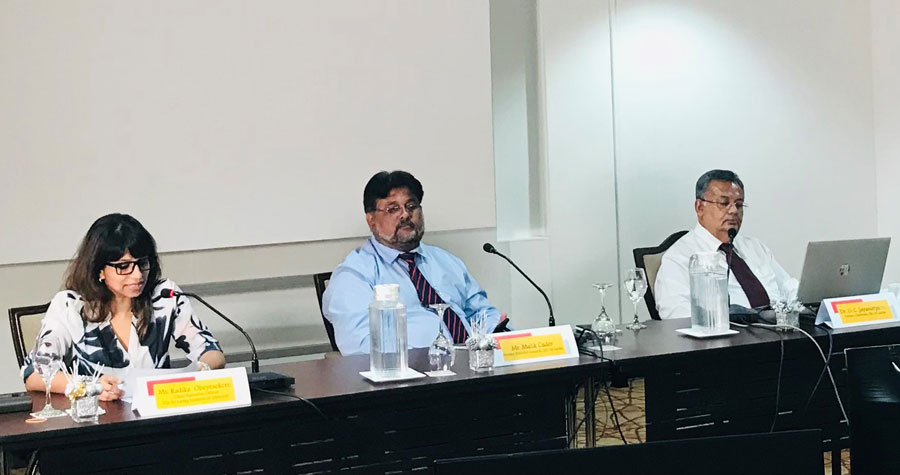The purpose of the session was to educate company directors on the relevant provisions of the Act and bring them up to date on the significant implications arising from it with regard to their role and responsibilities.
The two expert panelists, Dr. D. C. Jayasuriya P.C. and former Director General and Chairman of the SEC and Malik Cader, Attorney at Law and former Director General of the SEC in conversation with Faizal Salieh, Chairman of The Sri Lanka Institute of Directors provided several insights on the new Act and on how directors, auditors and company secretaries can adapt themselves to the new and tough regulatory regime.
Dr. Jayasuriya at the outset said that the new Act was comprehensive and has around 189 sections compared with the previous Act which had 40.
While the objectives of the two look very much similar it is noteworthy that there are two significant changes in the new Act, one of which is that it highlights the efficient and transparent securities markets and the second being the protection of foreign investors.
Stating that there were 4 approaches to the regulation of securities markets around the world such as merit, disclosure, and self-regulation, the new Act falls into an overkill situation with very strict regulation and penalties.
He also stated that it is very difficult to find any provision relating to the duties of the Directors under the Act and added that in comparison with the previous legislation, the new legislation has a broad regulatory reach and covers many products and market players.
The new Act also goes beyond an individual director particularly in the context where a determination has to be made as to whether a person is acting in concert with regards to a takeover or merger situation.
Dr Jayasuriya outlined 25 Do’s and Don’t’s for directors so that they will not be caught up under the Act.
Malik Cader stated that there is a perception among directors that the Act was “a draconian piece of legislation”, particularly in the context of the penalties that could be imposed.
He highlighted the key areas of concern arising from the new Act and said that directors of listed companies have to take serious note of some of its provisions and described them as a paradigm shift from what it used to be.
He mentioned specific areas such as good corporate governance practices including Fit & Proper criteria, duties of the auditor, issuance of securities, civil and criminal powers, and provisions relating to implementation.
Quoting that ‘no amount of rules and regulations will make a crooked man straight’, he stated that the fit & proper criteria included in the new Act was very commendable and that it is an effort to move toward a better governance structure for the capital markets.
He further emphasized that some of the provisions that relate to enhancing corporate governance is in the appointment of a director, CEO or CRO (Chief Regulatory Officer) of a market institution where one must obtain prior approval from the SEC notwithstanding the provisions of the Companies Act No. 7 of 2007.
Moderator Faizal Salieh observed that the SEC is of the view that the new Act will enhance investor confidence in our capital markets by strengthening its hands and teeth in dealing with market manipulators and offenders on a wider canvass.
He added that Sri Lanka is in a global setting where market manipulations and offences are beginning to see pronounced levels of increase; that Sri Lanka has had its share of market manipulations and therefore appropriate regulatory intervention was necessary to build trust and credibility in the capital market.
He said that companies should consider aligning their internal policies to the SEC Act provisions on insider trading and handling of “inside” information, such as professional secrecy policies; codes of conduct; access to information policies, etc.
The discussion noted that given the globalization of capital markets, sharing of information among regulators is crucially important.
Sec 171 (2) provides for this. Education of investors and market participants on ethical behavior standards; increasing the level of expertise of prosecutors and judges in dealing with capital market crimes and strict disclosure requirements that limit the scope of inside information and the time for keeping such information unpublished would help limit the potential for insider dealing.
Photo Caption From L to R Ms. Radhika Obeysekera Chief Executive Officer SLID, Malik Cader and Dr D. C. Jayasuriya P. C. (panelists)























